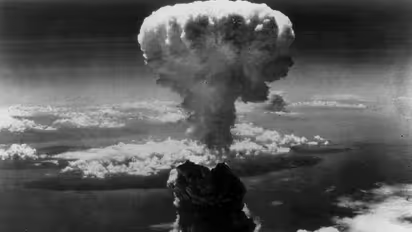Hiroshima attack: On this day in 1945 the atomic bomb shook the world

Synopsis
The 78th anniversary of the Hiroshima attack is observed worldwide as a day to remember and honour the victims of the August 6, 1945 atomic bombing. This commemoration emphasizes the immense human suffering caused by nuclear weapons.
The world is on Sunday observing the 78th anniversary of the Hiroshima attack. The day is primarily meant to remember and honour the victims of the August 6, 1945 atomic bombing. It serves as a way to pay tribute to the immense human suffering and tragedy caused by the use of nuclear weapons. The anniversary is often used as an opportunity to advocate for peace, nuclear disarmament, and the prevention of further use of nuclear weapons. It brings attention to the urgent need to work towards a world without nuclear threats.
The survivors of the atomic bombings, known as hibakusha, often use the anniversary to share their experiences and advocate for peace and nuclear disarmament. It provides a platform for their voices to be heard and their stories to be acknowledged.
Let's revisit the day the world learnt the immense destructive power of nuclear weapons:
Date and Time: The bombing of Hiroshima occurred on August 6, 1945, during World War II. The B-29 bomber aircraft named "Enola Gay" dropped an atomic bomb on the city at 8:15 AM local time.
Atomic Bomb Type: The bomb, codenamed "Little Boy," was a uranium-235 atomic bomb. It was the first time such a weapon had been used in warfare.
Devastation: The explosion and subsequent fires caused by the bomb obliterated an estimated 90 per cent of Hiroshima's buildings and caused immense destruction over a 13-square-kilometre area.
Immediate Casualties: The immediate death toll from the bombing was approximately 70,000 people, with thousands more succumbing to injuries and radiation exposure in the following weeks and months.
Long-Term Effects: Radiation exposure led to long-term health issues, including radiation sickness, cancer, and birth defects among survivors and their descendants.
Survivor Term: The survivors of the bombing are known as "hibakusha." Their experiences and advocacy have played a crucial role in raising awareness about the horrors of nuclear weapons and advocating for disarmament.
Japanese Surrender: The bombing of Hiroshima and a subsequent bombing of Nagasaki three days later played a significant role in Japan's decision to surrender to Allied forces, effectively ending World War II.
Peace Memorial: The Hiroshima Peace Memorial, commonly known as the Atomic Bomb Dome, is a UNESCO World Heritage Site and a symbol of the city's commitment to peace and the abolition of nuclear weapons.
Peace Park and Museum: The Hiroshima Peace Memorial Park, located near the epicentre of the explosion, includes the Peace Memorial Museum, which exhibits artefacts, testimonies, and information related to the bombing and its aftermath.
Global Impact: The bombings of Hiroshima and Nagasaki prompted international discussions about the ethics of using nuclear weapons and led to increased efforts to prevent further nuclear proliferation through international treaties like the Non-Proliferation Treaty (NPT).
Check the Breaking News Today and Latest News from across India and around the world. Stay updated with the latest World News and global developments from politics to economy and current affairs. Get in-depth coverage of China News, Europe News, Pakistan News, and South Asia News, along with top headlines from the UK and US. Follow expert analysis, international trends, and breaking updates from around the globe. Download the Asianet News Official App from the Android Play Store and iPhone App Store for accurate and timely news updates anytime, anywhere.